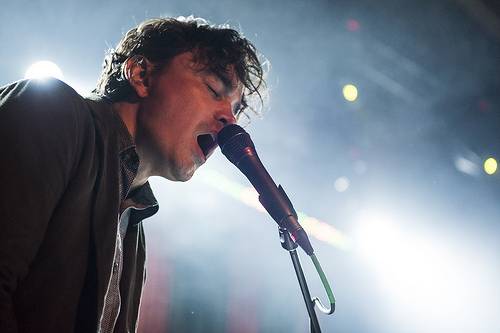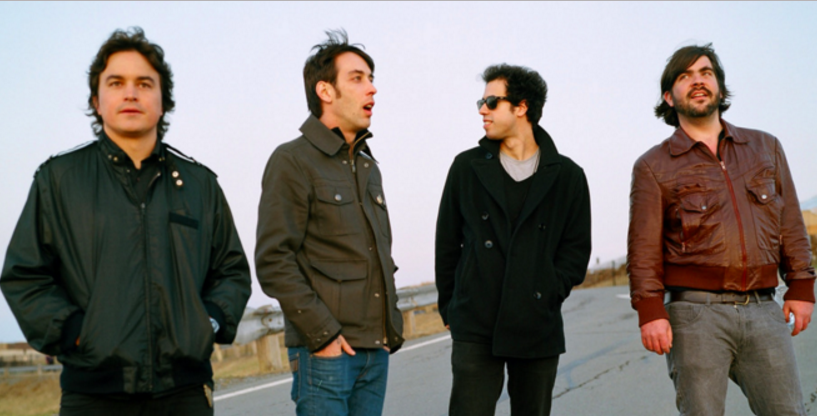How long does it take before a time becomes “way back when?” Approximately how many years have to pass before fondly thinking of something constitutes nostalgia? When it comes to music, it seems like a time needs to be about a decade removed, at least. The 60s, 70s, 80s and 90s all sound like “something,” they bring certain music to mind as standard. It’s now becoming time for the 2000s to have a sound as well.
Some of the indisputably best music from the aughts, and of all time, came from the genre of rock. This is music that knocks the wind out of you: Kid A, Yankee Hotel Foxtrot, White Blood Cells, or Funeral. The last mention is the seminal album by the indie band Arcade Fire, an act out of Montreal, and a key factor in the definition of music at that time. A close contemporary of that band is the group Wolf Parade, who came up in Montreal alongside their friends. These groups, and many others in Canada then, shaped the sound of the decade.
The band Wolf Parade formed in 2003, shortly after their aforementioned Montreal cohorts. Singer-songwriter and keyboardist Spencer Krug was attending school there when he met guitarist Dan Boeckner. Both with other bands, the two musicians decided to collaborate. With the addition of a few backing members, they eventually wound up with their own band, called Wolf Parade. Playing and creating in company with members of Arcade Fire, Wolf Parade’s recordings were in their infancy when Funeral came out. Wolf Parade immediately became eclipsed. They weren’t dissuaded by the success of their friends, though. Music-making in Canada was sort of a communal thing at the time, and when Wolf Parade were ready to tour, their very first show was as the opening act for Arcade Fire. After some EPs, with the help of their peers, they released their first LP, Apologies to the Queen Mary, in 2005. This album allowed the band to stand on their own.
Queen Mary had elements of the artists around them at the time, with intricate lyrics and sparse melodies, but Wolf Parade managed to differentiate themselves through emphasis on electronic sounds and synthesizers, brought together by a band member exclusive to the craft (Hadji Bakara). They were able to take influence from some of the ground-breaking ambient rock that preceded them, but they stayed light in theme, and steady with pop hooks and reliable choruses. (It’s noteworthy that Wolf Parade explored electronic sound manipulation earlier than Arcade Fire, who has adapted this style heavily in recent history.) Queen Mary features songs pulled from EPs and from other projects, like “I’ll Believe In Anything,” from Krug’s project Sunset Rubdown. Lyrically complex, the album juxtaposes themes of light and beginning with those of death and alienation. A hit on pop and rock charts in the U.S. and Canada, Queen Mary remains a stable indie rock classic to this day.
The 2000s saw the trend of Canadian indie bands swapping and sharing members, as evidenced by the different-every-day band Broken Social Scene, or the “supergroup” New Pornographers, and the members of Wolf Parade really got around. Since the inception of the band, Krug and Boeckner have been members of over a dozen musical acts between them. After spending three years fluctuating between it all, Wolf Parade released Queen Mary’s follow-up, At Mount Zoomer. Because of all their different projects, here, they are more self-aware as a band; they intend to sound like Wolf Parade. Their first LP was largely a combination of tracks from EPs and other reworkings, but Zoomer is an album to itself. Krug and Boeckner’s back-and-forth with the songwriting feels combative sometimes, but the album holds together with tracks like “Soldier’s Grin” and “California Dreamer.”

Spencer Krug.
Their third album, Expo 86, is released in 2010, and their sound changes a bit. It’s hard to pinpoint exactly why. The collaborative communes of their circle have dissolved a bit. Their synth man Bakara left the band and was replaced with a sound machine, and it’s audible. The songwriting is there, but the instrumentation plods. This album is Wolf Parade stepping back, and perhaps yawning at themselves. Although tracks like “Yulia” still make it enjoyable, their third album is where two talented musicians become a little bored. In 2011, the group went on an indefinite hiatus to pursue other interests, but that didn’t mean it was the end.
The absence of mutual exclusivity helped smooth out some wrinkles between Krug and Boeckner; if they weren’t creatively coalescing, they could always do something else for a while. This is why they went on the hiatus, without animosity, instead of breaking up. All members used the time to focus on current projects: Boeckner with his tech-rock band Operators, and Krug with his stripped down, one-man-project Moonface. Both acts put out work this year. With the end of the hiatus this year and the release of a new EP (entitled EP 4), it seems that Wolf Parade have returned because the whims of the artists have swayed back in that general direction. This always bodes well, because this kind of artistry isn’t forced – it’s fluid. Wolf Parade is part of the definition of music in the aughts because of their fluidity, and their prolific and ever-changing nature is aligned with the priorities of art today. It’s exciting to see what they do with this next decade.
———
Wolf Parade is playing the Pygmalion Festival on Friday, Sept. 23rd at The Accord Outdoor Stage 1, from 9:15 – 10:15. Visit the website for tickets and more information.








